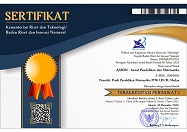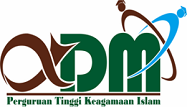A comparison of computational thinking skills: PBL model vs traditional learning
Abstract
Computational thinking abilities assist students in solving complex problems, enhancing productivity, and preparing them to face challenges in various fields. The problem-based learning (PBL) model was chosen because it is believed to improve students' computational thinking skills, as well as their critical and creative thinking abilities, which are often difficult to achieve through conventional learning. This research aims to determine the differences in students' computational thinking abilities through the application of problem-based learning and traditional learning methods. The research method was an experiment involving a population of all 2020 Mathematics Education students who took six linear program courses at Medan State University. Sampling was conducted using a random sampling technique, focusing on the PSPM 20B and PSPM 20C classes, totaling 60 students. This study employed a pretest-posttest control group design. Results from previous research indicated that the average computational thinking ability of students in the experimental class was higher than that of the control class, with scores of 82.67 for the experimental class and 69.00 for the control class. From the results of the average difference test, it can be concluded that there is a significant difference in the computational thinking abilities of students taught using the problem-based learning model compared to those taught using the traditional learning model, with PBL being more effective.
Keywords
Full Text:
PDFReferences
Abidin, Z., Herman, T., Wahyudin, Turmudi, & Penehafo, A.E. (2023). Computational thinking with an open-ended approach using interactive powerpoint media: an experiment in elementary schools. Journal of Engineering Science and Technology, 18(3), 1685-1695. https://jestec.taylors.edu.my/Vol 18 Issue 3 June 2023/18_3_23.pdf
Adelia, V., Putri, R.I.I., & Zulkardi. (2024). A systematic literature review: how do we support students to become numerate? International Journal of Evaluation and Research in Education (IJERE), 13(3), 1816. http://doi.org/10.11591/ijere.v13i3.26849
Ariandi, Y. (2016). Analisis kemampuan pemecahan masalah berdasarkan aktivitas belajar pada model pembelajaran pbl. PRISMA, Prosiding Seminar Nasional Matematika, 1(1), 579-585. https://journal.unnes.ac.id/sju/index.php/prisma/article/view/21561
Auliah, F.N., Febriyanti, N., & Rustini, T. (2023). Analisis hambatan guru dalam penerapan model problem based learning pada pembelajaran ips kelas iv di sdn 090 cibiru bandung. Journal on Education, 5(2), 2025-2033. https://doi.org/10.31004/joe.v5i2.846
Chen, Y.C., Tsui, P.L., & Lee, C.S. (2021). Is mathematics required for cooking? an interdisciplinary approach to integrating computational thinking in a culinary and restaurant management course. Mathematics, 9(18), 1-15. https://doi.org/10.3390/math9182219
Indarta, Y., Jalinus, N., Waskito, W., Samala, AD., Riyanda, A.R., & Adi, N.H. (2022). Relevansi kurikulum merdeka belajar dengan model pembelajaran abad 21 dalam perkembangan era society 5.0. Edukatif : Jurnal Ilmu Pendidikan, 4(2), 3011-3024. https://doi.org/10.31004/edukatif.v4i2.2589
Isabela, Surur, M., & Puspitasari, Y. (2021). Penerapan model pbl (problem based learning) untuk meningkatkan kemampuan percaya diri siswa. Jurnal Pendidikan Tambusai, 5(2), 2729-2739.
Jannah, A.U., Hasthiolivia, C., Azis, M.N., & Aprinastuti, C. (2023). Implementasi computational thinking melalui model pembelajaran problem-based learning pada mata pelajaran ipa di sd. COLLASE : Creative of Learning Students Elementary Education, 6(3), 416-423. https://doi.org/10.22460/collase.v6i3.17454
Juldial, T.U.H., & Haryadi, R. (2024). Analisis keterampilan berpikir komputasional dalam proses pembelajaran. Jurnal Basicedu, 8(1), 136-144. https://doi.org/10.31004/basicedu.v8i1.6992
Lee, T.Y., Mauriello, M.L., Ingraham, J., Sopan, A., Ahn, J., & Bederson, B.B. (2012). Ctarcade: learning computational thinking while training virtual characters through game play. Conference on Human Factors in Computing Systems - Proceedings, 2012-Janua(May 2012), 2309-2314. https://doi.org/10.1145/2212776.2223794
Lorenceau, A., Marec, C., & Mostafa, T. (2019). Upgrading the ict questionnaire Items in pisa 2021. OECD Publishing, 202, 1-49.
Maharani, S., Nusantara, T., As'ari, A.R., & Qohar, A. (2021). Exploring the computational thinking of our pre-service mathematics teachers in prepare of lesson plan. Journal of Physics: Conference Series, 1783(1), 1-8. https://doi.org/10.1088/17426596/1783/1/012101
Manullang, S.B., & Simanjuntak, E. (2023). Pengaruh model problem based learning terhadap kemampuan computational thinking berbantuan media geogebra. Journal on Education, 6(1), 7786-7796. https://doi.org/10.31004/joe.v6i1.4127
Masduriah, H. (2020). Pengaruh penggunaan model pembelajaran pbl terhadap keterampilan hots siswa sd. Prosiding Konferensi Ilmiah Dasar, 2(1), 277-285. https://prosiding.unipma.ac.id/index.php/KID/article/view/1576/0
Nana. (2021). Efektifitas model pembelajaran poe2we dalam menunjang pembelajaran jarak jauh di era revolusi industri 4.0. Klaten: Lakeisha.
Novianti, A., Bentri, A., & Zikri, A. (2020). Pengaruh penerapan model problem based learning (pbl) terhadap aktivitas dan hasil belajar siswa pada pembelajaran tematik terpadu di sekolah dasar. Jurnal Basicedu, 4(1), 194-202. https://doi.org/10.31004/basicedu.v4i1.323
Nurhidayat, W., & Nana. (2020). Model pembelajaran problem based learning (pbl): kajian literatur. Paper Knowledge . Toward a Media History of Documents, 12-26. https://doi.org/10.31219/osf.io/97jnz
OECD. (2022). Pisa 2022 results : the state learning and equity in education. Paris: OECD Publishing.
Pratiwi, G.L., & Akbar, B. (2022). Pengaruh model problem based learning terhadap keterampilan computational thinking matematis siswa kelas iv sdn kebon bawang 03 jakarta. Didaktik : Jurnal Ilmiah PGSD FKIP Universitas Mandiri, 8(1), 375-385. https://doi.org/10.36989/didaktik.v8i1.302
Putra, M.I.S., & Muqoyyidin, A.W. (2019). Pengembangan perangkat pembelajaran model problem based learning (pbl) untuk meningkatkan keterampilan berpikir kritis mahasiswa pgmi unipdu jombang. TARBIYA ISLAMIA : Jurnal Pendidikan Dan Keislaman, 8(2), 180. https://doi.org/10.36815/tarbiya.v8i2.473
Ramadhani. (2019). Metode penerapan model problem based learning (pbl). Lantanida Journal, 7(1), 75-86. http://doi.org/10.22373/lj.v7i1.4440
Rasto, & Pradana, R. (2021). Problem based learning vs sains teknologi dalam meningkatkan intelektual siswa. Jawa Barat: Penerbit Adab.
Rawash, H., Alawamreh, A.R., Obeidat, A.M., & Nawafleh, A.H. (2023). The effectiveness of problem-based learning in acquisition of knowledge using online learning. International Journal of Membrane Science and Technology, 10(3), 997-1007. https://doi.org/10.15379/ijmst.v10i3.1647
Rehmat, A.P., Ehsan, H., & Cardella, M.E. (2020). Instructional strategies to promote computational thinking for young learners. Journal of Digital Learning in Teacher Education, 36(1), 46-62. https://doi.org/10.1080/21532974.2019.1693942
Setiani, A., Lukman, H. S., & Suningsih, S. (2020). Meningkatan kemampuan pemecahan masalah matematis menggunakan strategi problem based learning berbantuan mind mapping. Prisma, 9(2), 128-135. https://doi.org/10.35194/jp.v9i2.958
Suratno, Kamid, & Sinabang, Y. (2020). Pengaruh konten pemasaran shoppe terhadap pembelian pelanggan. Jurnal Manajemen Pendidikan Dan IImu Sosial, 1(2), 506-515. https://doi.org/10.38035/JMPIS
Syahrullah, M. (2024). Transformasi pembelajaran dari metode konvensional ke metode modern : tantangan dan peluang di era digital. Karimah Tauhid, 3(12), 13388-13397. https://doi.org/10.30997/karimahtauhid.v3i12.16309
Syamsidah, T, R., & Muhiddin, A. (2019). Analisis awal model inquiry learning yang dapat meningkatkan keterampilan berpikir kreatif mahasiswa. Prodising Seminar Nasional Lembaga Penelitian Universitas Negeri Makassar "Diseminasi Hasil Penelitian Melalui Optimalisasi Sinta Dan Hak Kekayaan Intelektual," 1013-1019. https://ojs.unm.ac.id/semnaslemlit/article/view/14674
Van Borkulo, S., Chytas, C., Drijvers, P., Barendsen, E., & Tolboom, J. (2021). Computational thinking in the mathematics classroom: fostering algorithmic thinking and generalization skills using dynamic mathematics software. ACM International Conference Proceeding Series. https://doi.org/10.1145/3481312.3481319
Widiyastuti, E., & Jazuli, A. (2019). Deskripsi kemampuan berpikir analitik matematis mahasiswa pendidikan matematika. Proceeding of The 8th University Research Colloquium 2018: Bidang Pendidikan, Humaniora Dan Agama, 401-409. https://garuda.kemdikbud.go.id/documents/detail/3723530
Wing, J. (2006). Pemikiran komputasional. Komunikasi ACM, 49(1), 33-35. https://doi.org/10.1145/1118178.1118215
DOI: http://dx.doi.org/10.30821/axiom.v14i1.13660
Refbacks
- There are currently no refbacks.
Copyright (c) 2025 Erlinawaty Simanjuntak, Sahat Saragih, Elvis Napitupulu

This work is licensed under a Creative Commons Attribution-ShareAlike 4.0 International License.
p-ISSN: 2087-8249 | e-ISSN: 2580-0450
Indexed by:
AXIOM : Jurnal Pendidikan dan Matematika is licensed under a Creative Commons Attribution-ShareAlike 4.0 International License.











